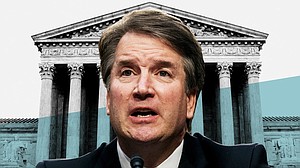10/5/2018

Analysis by Chris Cillizza, CNN Editor-at-large
(CNN) -- The Supreme Court nomination of Brett Kavanaugh took a major step forward on the Senate floor Friday morning, as 51 senators voted to end debate in the chamber and move toward a vote on final confirmation on Saturday.
That vote was a massive boost for Kavanaugh, Senate Majority Leader Mitch McConnell and President Donald Trump, who had privately fretted since allegations of sexual assault against the judge were revealed two weeks ago that he might not make it to even this point.
And to be clear, "this point" is not the end point. Voting for an end to the endless debate that defines the Senate is not the same thing as voting for Kavanaugh's final confirmation.
But, make no mistake: The cloture vote was seen as an absolutely key test of Kavanaugh's strength among the four undecided Senators -- Republicans Susan Collins of Maine, Jeff Flake of Arizona and Lisa Murkowski of Alaska, as well as Democrat Joe Manchin of West Virginia -- who had (and have) the ability to make or break the nomination.
In the end, three of those four undecideds -- Collins, Flake and Manchin -- voted to end debate. Murkowski opposed it.
So what does that mean? Well, given that a vote for cloture ≠ a vote for confirmation, we should all be wary of drawing too many conclusions.
BUT, here's what the cloture vote suggests:
Most obviously, that Murkowski is almost certainly a "no" on Kavanaugh's confirmation. As the lone Republican to vote against cloture, it would be very strange for her to then vote for his confirmation. (Worth noting: Murkowski told a local radio station last week that she had experienced her own #MeToo moment -- although she provided no further details.)
Murkowski seemed to confirm that fact shortly after the cloture vote, calling it "the most difficult evaluation" she's had to make. "He's not the right man for the court at this time," she said. "So I have taken my vote here this morning. I'm going to go back to my office and write a floor statement that is more fulsome."
Flake's "yes" vote -- combined with his comments Thursday that the FBI's supplemental investigation had been thorough and provided no corroborating evidence of the allegations made by Christine Blasey Ford and Deborah Ramirez -- suggested he would almost certainly be a "yes" on final confirmation. He told MSNBC after the cloture vote that he plans to vote "yes" on Kavanaugh's nomination.
Those two votes would put the vote count on Kavanaugh's confirmation at 49-49, meaning Republicans would need one more "yes" vote to put Kavanaugh on the Court. (Vice President Mike Pence would break a 50-50 tie in Kavanaugh's favor.)
Which leaves Collins and Manchin. Collins is expected to announce her final decision in a speech on the Senate floor at 3 p.m., ET. And Manchin has said little about how he was leaning prior to supporting cloture.
Some sharp observers have noted that Collins has voted for cloture and then against confirmation before -- most notably in the case of Education Secretary Betsy DeVos. And there is some sense that Manchin, despite the fact that Trump won his state by 43 points and he is up for reelection in 32 days, wouldn't be willing to be the 50th (and deciding) vote on Kavanaugh.
Which, maybe! As I said above, nothing is official until the final confirmation vote happens on Saturday. But remember a few things here:
Collins hasn't opposed any Supreme Court nominee since she was elected to the Senate in 1996.
Manchin is currently ahead in his race against state Attorney General Patrick Morrisey and would be loath to hand his GOP opponent such a major issue -- that is so important to the state's conservative base -- this close to an election.
Plus, on top of those realities is this one: Collins and Manchin both voted for cloture. That's not conclusive evidence of what they will do on Saturday, but it sure looks better for Kavanaugh's chances than if they had voted against ending debate on the nomination.
The Point: The cake isn't baked yet. But it's getting very, very close to being done.
